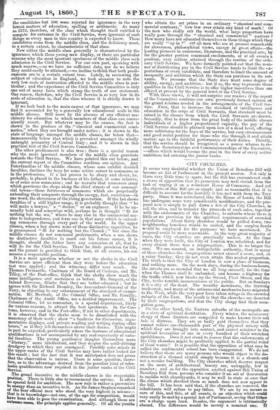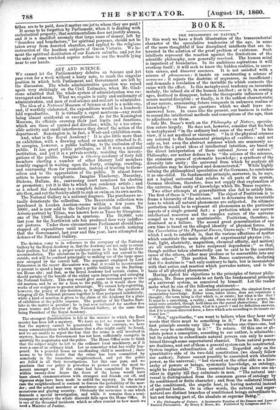CITY CHURCHES.
Jr seems very doubtful whether the Union of Benefices Bill will become an Act of Parliament in the present session. Not only is there very little time to spare, but the Bill has encountered such a storm of opposition that its promoters may well shrink from the task of urging it on a reluctant House of Commons. And yet the objects of this Bill are so simple and so.reasonable that it is difficult to account for the hostility it has met with from the Tory party. Since it was introduced into the House of Lords, the Bill has undergone some very considerable modifications, and the pro-
posal now is simply to pull down a few of the City Churches, to sell the sites, and to transfer the proceeds of such sales, together with the endowments of the Churches, to suburbs where there is little or no provision for the spiritual requirements of crowded. populations. About thirty churches would be pulled down, two
neighbouring benefices would be united, and the surplus funds would be employed for the purposes we have mentioned. No proposal could be more reasonable. In the very great majority of cases, the City churches are practically useless. At the time when they were built, the City of Loudon was inhabited, and for every church there was a congregation. This is no longer the case. We are assured, on indisputable authority, that in many of these churches the congregations never exceed a score, and, on a rainy Sunday, they do not even attain this modest proportion. The truth is that the City of London is now a place of business, and nothing more. On the week days, during the business hours, the streets are so crowded that we all long earnestly for the time when the Thames shall be embanked, and become a highway for the traffic which now blocks up the Strand, Fleet Street, and the City, to the terrible inconvenience of the public. But on Sundays it is a city of the dead. The wealthy merchants, the thriving tradesmen, and many of the artisans and mechanics have migrated to the West, while the very poor have taken refuge in the crowded suburbs of the East. The result is that the churches are deserted by their congregations, and that the City clergy find their occu- pation gone.
On the other hand, the Eastern suburbs of the metropolis are in a state of spiritual destitution. Every winter, the missionary clergy of those districts are compelled to make known their sad talc of distress. They are so badly paid themselves that they cannot relieve one-thousandth part of the physical misery with which they are brought into contact, and cannot minister to the spiritual necessities of one in every hundred of their wretched parishioners. Does it not stand to reason that the endowments of the City churches might be profitably applied to the partial relief of these wants P It is possible that the opposition of what may be called the sentimental school has been exaggerated. We do not believe that there are many persons who would object to the de- struction of a disused church simply because it is a church and not a secular building. The City churches which deserve respect on the score of architectural beauty are, unhappily, few in number; and as for the opposition excited against this Union of Benefices Bill from persons who consider it an act of desecration to meddle with churchyards, it may be well to state at once that the clause which shocked them so much does not now appear in the bill. It has been said that, if the churches are removed, the inhabitants will refuse to pay tithes. We are by no means so sure of this and this, at all events, is an objection which could very easily this, met by a special Act of Parliament, seeing that tithes are a charge upon land. Besides the argument is intrinsically absurd. The difference would be merely a -nominal one. If
tithes are to be paid, does it matter one jot to whom they are paid ?
It seems to be forgotten by Parliament, when it is dealing with ecclesiastical property, that sentimentalism does not justify abuses, and it is a manifest anomaly that large sums of money, left by "founders and benefactors,' for spiritual purposes, should not be taken away from deserted churches, and applied to the religious instruction of the heathen subjects of Queen Victoria. We la- ment the spiritual destitution of our Eastern suburbs, and yet for the sake of some wretched caprice refuse to use the wealth lying near to our hands.



























 Previous page
Previous page